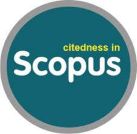PENGARUH PENERAPAN METODE INKUIRI TERHADAP SIKAP ILMIAH SISWA PADA PEMBELAJARAN IPA SEKOLAH DASAR (Penelitian Quasi Eksperimen Pada Pokok Bahasan Energi Listrik dan Perubahannya Untuk Siswa Kelas VI Sekolah Dasar)
Abstract
This research is motivated by the lack of attention from the teacher to the learners’ scientific attitude in learning science at elementary school. This happened because of the lack of balance in developing the nature of learning science which resulted in the students’ low scientific attitude. The researchers applied inquiry based learning method. The purpose of this study is to determine the influence of the scientific method of inquiry on the attitudes of students in learning science. This research used quasiexperiment designthrough Non-equivalent control group design. The subject of this study focused on 30 students of class VI A and 34 students of class VI B. The research instrumentsare a questionnaire to measure the students’ scientific attitude in the pretest and posttest, and the observation sheet. The empirical result demonstrated; 1) an increase in the dimensions of scientific attitude in control class with N-Gain value of 0.15 which are included in the low category; 2) an experimental class increased scientific attitude with N-Gain 0.53 which are included in the category; 3) There are significant differences to the scientific attitude of sixth grade students of primary school in the experimental class who obtained learning by using the methods of inquiry and control classes by applying the conventional approach. The results from analysis test, the average difference in gain, with a P value <α (H1 acceptable), showing that there were differences in scientific attitude of students because of the effect of applying the method of inquiry. This research is expected to contribute to education, especially the improvement of primary school science teaching.
Full Text:
PDFReferences
Akhyani, A., Sopandi, W., & Setiabudi, A. (2008). Model Pembelajaran Kesetimbangan Kimia Berbasis Inkuiri Laboratorium Untuk Meningkatkan Penguasaan Konsep dan Keterampilan Berpikir Kritis Siswa SMA. Jurnal Penelitian Pendidikan IPA Vol. II No.1, Maret 2008. Universitas Pendidikan Indonesia, 303.
Amri, S., & Ahmadi, I. K. (2010). Proses Pembelajaran Kreatif dan Inovatif dalam Kelas. Jakarta: PT. Prestasi Pustakarya.
Anita. (2013). Pendekatan Kontruktivisme Untuk Meningkatkan Hasil Belajar Siswa Pada Pembelajaran IPA. Penerapan Pendekatan Kontruktivisme Untuk Meningkatkan Hasil Belajar Siswa Pada Pembelajaran IPA.
Bundu, P. (2006). Penilaian Keterampilan Proses Dan Sikap Ilmiah. Jakarta: Departemen Pendidikan Nasional.
Hamdani. (2011). Filsafat Sains. Bandung: Pustaka Setia.
Jufri, W. (2013). Belajar dan Pembelajaran Sains. Bandung: Pustaka Reka Cipta.
Nuraini, I. (2014). Identifikasi Keterampilan Proses Sains dan Sikap Ilmiah yang Muncul Melalui Pembelajaran Berbasis Praktikum pada Materi Nutrisi Kelas XI. Skripsi Jurusan Pendidikan Biologi Fakultas Pendidikan Matematika dan Ilmu Pengetahuan Alam Universitas Pendidikan Indonesia. Tidak Diterbitkan.
Samatowa, U. (2011). Pembelajaran IPA di SEKOLAH DASAR. Jakarta: PT Indeks. Sanjaya , W. (2011). Strategi Pembelajaran Berorientasi Standar Proses Pendidikan. Bandung: Humaniora.
Selly, G. (2010). Sikap Ilmiah Siswa pada Pembelajaran IPA. 4.
Sugiyono. (2015). Metode Penelitian Pendidikan. Bandung: Alfabeta.
Susanto, A. (2013). Teori Belajar dan Pembelajaran di Sekolah Dasar. Jakarta: Prenada Media Group.
Toharudin, U., Hendrawati, S., & Rustaman, A. (2011). Membangun Literasi Sains Peserta Didik. Bandung: Humaniora.
Wisudawati, A. W., & Sulistyowati, E. (2015). Metodologi Pembelajaran IPA. Jakarta: Bumi Aksara.
Zahara, R. (2013). Pengembangan Lembar Kerja Siswa (LKS) Praktikum Berbasis Inkuiri Terbimbing Pada Sub Pokok Materi Hubungan Hasil Kali Kelarutan dan Pengendapan. Skripsi Jurusan Pendidikan Kimia Fakultas Pendidikan Matematika Dan Ilmu Pengetahuan Alam Universitas Pendidikan Indonesia. Tidak Diterbitkan.
DOI: https://doi.org/10.17509/md.v11i1.3784
Refbacks
.png)
Universitas Pendidikan Indonesia, Purwakarta Campus
Jl. Veteran No. 8. Purkawarta
West Java, Indonesia
Email: metodikdidaktik@upi.edu


























